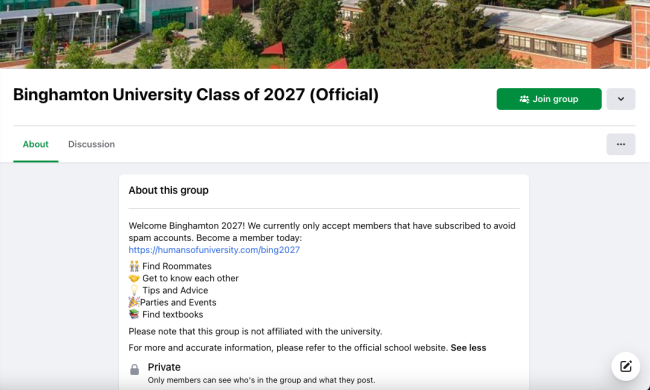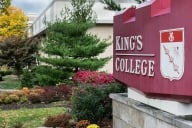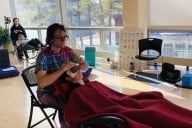You have /5 articles left.
Sign up for a free account or log in.

Paid Facebook groups, like this one for Binghamton University, offer incoming first-year students an opportunity to connect with their classmates.
Johanna Alonso/Inside Higher Ed
Facebook groups targeting incoming freshmen have long been a source of frustration for the institutions whose names they use. But this year some unaffiliated groups are profiting off students by asking them to pay to join a “Class of 2027” page.
Most of the groups are titled some variation of “[Institution Name] Class of 2027 (Official)” and use the college’s logo or a campus photo as the header image. The page description typically encourages incoming students to join the group to connect with potential roommates, learn more about the institution or find textbooks.
At the end of the description, the group usually offers a disclaimer: “Please note that this group is not affiliated with the university. For more and accurate information, please refer to the official school website.”
Humans of University, the company behind many of these groups, said in an email exchange with Inside Higher Ed that it didn’t set out to make money off students seeking connections in college. The emails were unsigned, though they said the company was started by a group of college sophomores as a “Humans of New York”–like page to share college students’ stories.
The spokesperson wrote that the membership fee—$2.99, billed monthly until the subscription is canceled through the billing platform—is used to prevent scammers from joining the group and can be circumvented if someone sends them proof that they really are a prospective student at the university, though that workaround isn’t publicized on the pages.
The groups only recently began charging users, Humans of University said; they had previously used a Facebook feature that allows groups to ask potential members verification questions.
“We did have a built-in method of asking student questions before they can join. However, scammers can simply google these and put up an answer,” wrote the spokesperson. The company became incorporated in Ontario in April of this year.
Still, Humans of University likely makes a solid profit from its endeavors. Its Virginia Tech Class of 2027 group has 2,620 members. If they all paid the $2.99 fee once, it would have earned Humans of University nearly $8,000. The company runs nearly 800 unique “Class of” Facebook groups—including 361 for the Class of 2027—many of which have over 1,000 members. The company did not immediately respond to questions about how much it has earned from these fees and where the money goes.
Social Media Struggles
Kasandrea Sereno, a consultant specializing in social media for higher education, said that universities have long dealt with faux Facebook groups and other social media accounts. In the past, such groups would gather the demographic data of the target population to build a profile of that university’s students and then direct advertisements toward people who match that profile. Or they sought buyers looking to post advertisements or political propaganda to a captive audience.
(Humans of University told Inside Higher Ed that it has never collected any of its members’ data.)
But even when a group’s intentions aren’t malicious, it can be a problem for a university; misinformation spread in a Facebook group that features a college’s logo, for example, is more likely to be mistaken for legitimate.
“That becomes a reputation issue” for the university, Sereno said.
Some universities appear less bothered than others by the imposters. When asked if the university was concerned about its Humans of University doppelgänger, a spokesperson for Ohio State University said in an email that people could tell it wasn’t affiliated due to the group’s disclaimer. The spokesperson noted that during orientation, the university encourages students and families to get their information from official channels.
Others, however, have tried to figure out the best way to deal with unaffiliated groups.
“UW-Madison is aware of non-sanctioned Facebook groups, such as the one you flagged,” a spokesperson wrote in an email. “When these come to our attention, we first attempt to message the group moderator, and then file terms of service complaints to ensure that the groups are clearly marked as unaffiliated and do not use university logos or marks. In general, we suggest that students and parents follow official UW-Madison Facebook accounts for the most accurate and up to date information.”
Facebook did not reply to a request for comment. Stripe, the billing platform Humans of University uses, declined to comment on its account and did not respond to a broader follow-up question about its policies, which prohibit “products and services that infringe intellectual property rights.”
Humans of University said that it has never received any negative feedback from a university. The company also said it was beginning to partner with universities to help them moderate their official pages, though it declined to name which institutions.
“The main reason the university/college don’t [sic] create these groups is because it is impossible to moderate these groups 24/7. Schools usually don’t want to be liable for any content posted on social media, especially if it’s a group created by them,” the spokesperson wrote.
Sereno also noted that Facebook has been declining in popularity among young people in recent years.
Some institutions have turned to alternative apps to help incoming students build connections. ZeeMee is one such app, allowing colleges and universities to set up their own communities in which students can interact with one another and with the institution. The app also has a dedicated Roommate Match feature.
Harrison “Soup” Campbell, head of marketing and brand for ZeeMee, said the app has clear benefits over other social media sites.
“Today, traditional social platforms like Meta’s Facebook and Instagram are no longer really social platforms at all,” Campbell said. “They have evolved into ad platforms full of algorithms that limit organic reach and manipulate users to keep them on their platforms as long as possible so they can be fed a constant stream of ads. When it comes to Admitted Student Facebook groups, they’ve seen a steady decline year-over-year and haven’t been relevant for several years now. This is partly because it is a legacy platform in the eyes of Gen Z. It is literally the platform that their grandparents use. There is no better way a college/university can show how uncool they are than by inviting a prospective student to join a FB group.”
Why Join?
James Collins, a psychology professor at Middle Georgia University who has studied disconnectedness among young people, said he believes such platforms feel vital to students because they’re uncomfortable being alone—especially at the beginning of freshman year, when everyone around them is also trying to make friends and get acclimated.
“I think in general that people, especially younger people, are feeling disconnected from real life. Going to college is a real-life event, and so I think they’re just using an electronic, comfortable social media mechanism to reduce some of that uncertainty and to make some—and they’re really superficial—but to make some connections so they don’t feel so alone,” he said. “I don’t know if it’s going do the trick, is the problem.”
The Facebook pages, as well as the Instagram pages that Humans of University also owns, feature students posting pictures and descriptions of themselves, asking potential roommates and friends to reach out. Collins said he didn’t expect members of the groups to form lasting connections, as it’s impossible to know what it’s really like to spend time with someone if you only know them virtually.
“Human beings were designed to be within physical proximity of each other,” he said. "One of my favorite jokes is, our sense of smell is not very good compared to other animals’ … but we do need to know what each other smells like. There’s real evolutionary value to it.”
Campbell, of ZeeMee, said he is currently conducting research on why students look to connect with one another before they arrive on campus. He believes a key factor is that these connections help to ease the larger anxiety of moving away from home and heading to college.
“[Incoming students] find comfort in knowing that they are on a shared journey experiencing the same feelings,” he wrote. “They support each other through every step of the process.”



